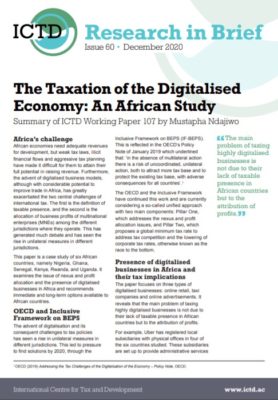Research in Brief 60
African economies need adequate revenues for development, but weak tax laws, illicit financial flows and aggressive tax planning have made it difficult for them to attain their full potential in raising revenue. Furthermore, the advent of digitalised business models, although with considerable potential to improve trade in Africa, has greatly exacerbated the two central challenges of international tax. The first is the definition of taxable presence, and the second is the allocation of business profits of multinational enterprises (MNEs) among the different jurisdictions where they operate. This has generated much debate and has seen the rise in unilateral measures in different jurisdictions. This paper is a case study of six African countries, namely Nigeria, Ghana, Senegal, Kenya, Rwanda, and Uganda. It examines the issue of nexus and profit allocation and the presence of digitalised businesses in Africa and recommends immediate and long-term options available to African countries.
